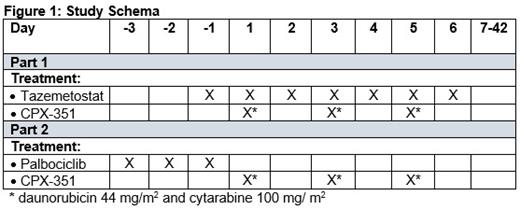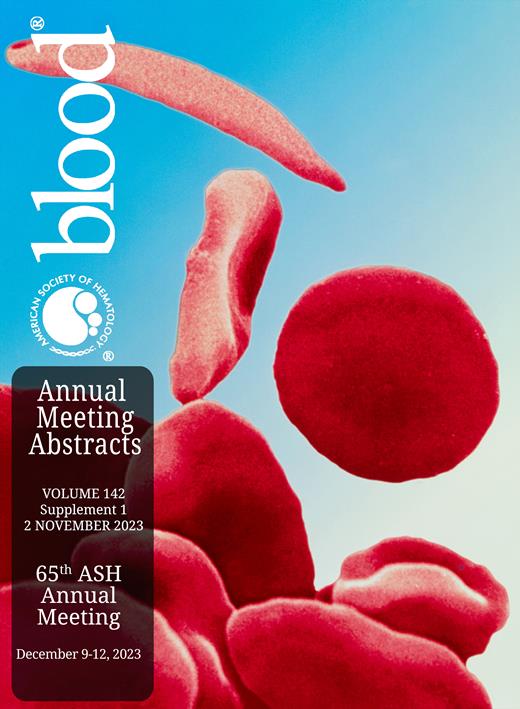BACKGROUND AND SIGNIFICANCE
Acute myeloid leukemia (AML) is an aggressive cancer of early hematopoietic progenitor cells with only 25-30% of patients (pts) surviving 5 years from diagnosis. For fit pts, conventional chemotherapy with DNA-damaging agents remains the mainstay of treatment. Conventional chemotherapeutic agents cause DNA-damage by targeting cells during DNA replication. Chromatin structure is highly influential in the efficacy of DNA-damaging agents, as areas of compacted chromatin are more resistant to DNA-damaging effects. Areas of DNA marked with histone 3 lysine 27 trimethylation (H3K27me3) are transcriptionally repressed and exhibit reduced accessibility to DNA-damaging agents.
Enhancer of Zeste Homolog 2 (EZH2) serves as the catalytic subunit of the polycomb repressive complex 2 which methylates H2K27 to produce a di- or trimethylated state (H3K27me2/3). In preclinical studies, treatment of AML cell lines with the combination of an EZH2 inhibitor (EZH2i) and doxorubicin resulted in an increase in DNA damage and apoptosis compared to those treated with doxorubicin alone. Further, a significant decrease in leukemia burden was seen in mice injected with THP-1 (AML) cells and treated with an EZH2i and doxorubicin and cytarabine compared to doxorubicin and cytarabine alone. This effect was further enhanced by pre-treatment of AML cells with palbociclib (PALB), a CDK4/6 inhibitor, by significantly increasing the number of cells in S phase when exposed to the EZH2i and doxorubicin combination, resulting in an increase in DNA damage and apoptosis compared to cells that were not pre-treated with PALB. These findings were reproduced in in vivo studies with mice injected with the primary AML cells (Porazzi P, et al. Cancer Res., 2021).
STUDY DESIGN AND METHODS
We will perform a 2-part phase I dose escalation study utilizing EZH2i tazemetostat (TAZ) in combination with CPX-351 induction chemotherapy and of PALB pre-treatment followed by CPX-351 in pts with relapsed or refractory (R/R) AML (NCT05627232). All pts will receive CPX-351 at standard dose on days 1, 3 and 5. Part 1 evaluate the addition of TAZ to CPX-351 via traditional 3+3 design. Pts will be treated with TAZ on days -1 to 6 at a starting dose of 600 mg twice daily to open chromatin concurrent with CPX-351 administration. Part 2 evaluate the pre-treatment with PALB via traditional 3+3 design. Pts will be treated with PALB starting dose of 100 mg daily on days -3 to -1 to induce cell cycle G1. PALB will be held on day 1 to allow cells to then enter S phase prior to administration of CPX-351. ( Figure 1).
The study will enroll pts with R/R AML treated at Sidney Kimmel Cancer Center. Pts must be ≥18 years of age with R/R AML (non-acute promyelocytic leukemia) and have received at least 1 prior line of therapy and have adequate performance status and organ function. Pts whose participation would result in a total cumulative dose of daunorubicin greater than 550 mg/m 2 (450 mg/m 2 if they previously received mediastinal radiation) and those with active central nervous system involvement of AML, unstable cardiac disease or other severe concurrent disease will be excluded.
The primary endpoints of Parts 1 and 2 will be to determine the maximum tolerated dose of TAZ and of PALB in combination with CPX-351, respectively. Secondary endpoints for Parts 1 and 2 include preliminary assessment of efficacy. Correlative studies to evaluate the on-target effect of TAZ on H3K27me3 and DNA-damage and of PALB on cell cycling will be performed at protocol-specified time points. If these two 2-drug combinations prove to be safe, we will amend the protocol to add Part 3 which will evaluate the safety of the 3-drug combination of pre-treatment with PALB followed by co-treatment with TAZ and CPX-351.
Disclosures
Keiffer:Abbvie: Research Funding; Astellas: Membership on an entity's Board of Directors or advisory committees; Prelude Therapeutics: Research Funding; Cyteir Therapeutics: Research Funding. Binder:Karyopharm: Speakers Bureau; Janssen: Research Funding, Speakers Bureau. Porcu:BioGene: Membership on an entity's Board of Directors or advisory committees; Kymera: Membership on an entity's Board of Directors or advisory committees; Kyowa: Consultancy; Dren-Bio, ADCT, Lilly-Loxo, Viracta, Innate Pharma: Membership on an entity's Board of Directors or advisory committees; Ono: Consultancy, Membership on an entity's Board of Directors or advisory committees, Research Funding; Kyowa, Daiichi, Viracta, Dren Bio, Innate Pharma: Consultancy; Kyowa, Daiichi, Viracta, Dren Bio, Innate Pharma, Ono: Honoraria; Teva: Research Funding; Innate Pharma: Research Funding. Wilde:Gilead: Research Funding. Kasner:Kronos: Membership on an entity's Board of Directors or advisory committees; Astellas: Membership on an entity's Board of Directors or advisory committees; BMS: Research Funding; Pfizer: Research Funding; Gilead: Research Funding; Kartos/Telios: Research Funding.


